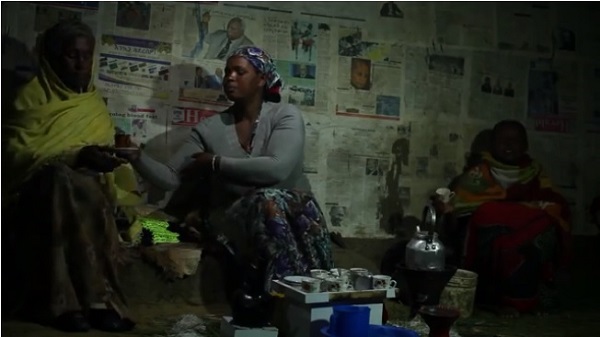
Since its launch in Ethiopia in 2015, IFC-World Bank’s Lighting Africa program has enabled more than 1 million people to meet their basic electricity needs.
(IFC)–When the sun sets in Ethiopia, eight out of 10 citizens must resort to unhealthy lighting sources for basic daily activities like cooking or studying. These sources include kerosene lamps, wood fires, and expensive—but often unreliable—battery-powered appliances.
With support from the Lighting Africa/Ethiopia initiative, a growing number of people now have access to clean, inexpensive solar power to light their homes and grow their businesses instead. The IFC-World Bank program works with manufacturers and distributors of lighting products, among other partners, to build markets for off-grid lighting products and promote their use in sub-Saharan Africa. Shukri Dinsefa, who sells farm products and household goods, including solar lights, to members of his local farming cooperative in the town of Butajira, is one of many who benefit from the initiative.
“Now the children of co-op members can study at night,” Dinsefa says. They are enjoying cleaner air as opposed to the smoke they had to inhale from fuels they used to use.”
Dinsefa stocks lights and other off-grid appliances that meet standards set by Lighting Africa’s affiliate Lighting Global. These standards are important because they allow consumers to identify reliable products, and protect the market from being tainted by an influx of poor-quality goods. Awareness campaigns reaching more than 15 million Ethiopian consumers have also helped build a sustainable off-grid energy sector.
Since its launch in Ethiopia in 2015, the program has enabled more than 1 million people—like Dinsefa and his customers—to meet their basic electricity needs. Ethiopians have purchased 1.3 million Lighting Global quality-assured products.
ALSO READ: Italian Company Enel to Build Solar Plant in Metehara, Ethiopia
Those results reflect a worldwide trend: more than 140 million people in over 80 countries are using Lighting Global’s quality-verified products to light their homes and power their businesses. By replacing kerosene-powered alternatives, the global program avoids 2.9 million tons of greenhouse gases every year—the equivalent of removing 364,000 cars from the road.
Connecting Small Retailers with Resources
Residents of Butajira—a town 130 kilometers south of Ethiopia’s capital, Addis Ababa—can also purchase solar lights, mobile phone chargers, and other off-grid appliances from Zemede Mulatu, who runs five kiosks. Mulatu received training from Lighting Africa/Ethiopia in business management, marketing, sales, distribution, and knowledge and maintenance of off-grid solar products.
This foundation helped Mulatu become an entrepreneur. Among other benefits, the training taught him how to engage with local microfinance institutions and help potential customers access the funds they need to buy his products. Results came fast: following the training, Mulatu’s sales jumped from just six off-grid products per month to 50 per month.
Read the complete story at IFC
Lighting Africa program in Ethiopia
The Lighting Africa program in Ethiopia is funded by various donors including the Scaling-Up Renewable Energy Program (SREP) of the Climate Investment Funds, the Energy Sector Management Assistance Program (ESMAP), Canada, Italia and others, and was developed in conjunction with Ethiopia’s government through its Ministry of Water, Irrigation and Electricity (MoWIE), and other partners. Key target groups include low-income, rural households and micro-businesses. To date, the program has provided valuable insights through market intelligence reports, supporting both existing players and new market entrants.
